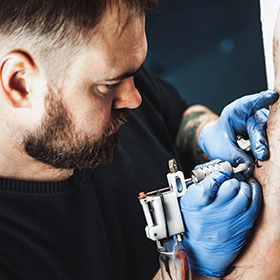No, shaving over a tattoo does not make it fade. But, it can cause irritation if not done properly.
Tattoos are a popular form of self-expression. Many people wonder if daily activities, like shaving, can affect their tattoo. Understanding the impact of shaving on tattoos is important for proper care. Tattoos sit beneath the skin’s surface, so normal shaving won’t damage the ink.
But, improper shaving techniques can lead to skin irritation or infection. This can impact the appearance of your tattoo. In this post, we will explore how to shave over tattoos safely. We will also give tips on keeping your tattoo vibrant and healthy. So, let’s dive into the details and ensure your tattoo looks great for years to come.
Tattoo And Shaving Basics
Tattoo ink sits in the dermis. This is the middle skin layer. Shaving only affects the top layer, the epidermis. The dermis is deeper and not touched by shaving. So, the ink stays safe and intact.
Use a clean and sharp razor. This avoids skin irritation. Shave in the hair’s direction. It’s gentle and safe. Apply moisturizing lotion after shaving. This keeps the skin healthy. Healthy skin protects the tattoo better.
Common Myths
Many people think shaving over a tattoo makes it fade. This is not true. Shaving does not reach the ink in the skin. Tattoo ink is deep in the skin layers. Shaving only removes hair and dead skin cells. It does not touch the tattoo ink. So, shaving over a tattoo does not make it fade.
Some believe shaving over a tattoo changes its color. This is also false. Shaving does not affect the tattoo ink. The ink stays the same color even after shaving. The tattoo looks the same before and after shaving. Discoloration does not happen because of shaving. The color remains strong and clear.
Shaving Over New Tattoos
New tattoos need time to heal. The skin is sensitive. A new tattoo can take 2 to 4 weeks to heal. During this time, the skin may be red or swollen. It is important to keep the area clean. Avoid any irritation to the tattooed skin.
Shaving too soon can harm your tattoo. It may cause infections. The razor can cut the healing skin. This can lead to scabs and scarring. The tattoo might lose its color. Wait until the skin is fully healed.
Shaving Over Healed Tattoos
Using the right tools is important. A sharp razor is best. It cuts hair cleanly. This reduces skin irritation. Electric razors are also good. They are gentle on the skin. Avoid old, dull razors. They can cause nicks and cuts. This may harm your tattoo. Use shaving cream or gel. It helps the razor glide. This prevents pulling on the skin. It also keeps the tattoo safe.
Take care of your skin. Moisturize daily. This keeps the skin soft. Drink plenty of water. Hydrated skin is healthy skin. Use sunscreen to protect your tattoo. UV rays can fade tattoos. Keep your tattoo clean. Wash it gently with mild soap. Avoid harsh scrubbing. Pat dry with a soft towel. Do not rub. This can irritate the skin. Follow these steps to keep your tattoo looking great.
Factors Affecting Tattoo Longevity
Shaving over a tattoo does not make it fade. Proper technique and care are essential. Frequent shaving can irritate the skin, but it won’t affect the ink.
Sun Exposure
Sunlight can harm your tattoo. UV rays break down ink. Always protect tattoos from sun. Use sunscreen with high SPF. This helps keep colors bright. Sun damage is real. Avoid direct sunlight as much as possible.
Skin Care Products
Some products can fade tattoos. Harsh soaps and creams are not good. Use gentle products always. Moisturize your skin daily. Dry skin can hurt tattoos. Keep skin healthy and hydrated. This helps tattoo look better and last longer.
Professional Advice
Tattoo artists suggest being careful when shaving over a tattoo. Fresh tattoos need time to heal. Shaving too soon can harm the tattoo. Wait until the skin is fully healed. This may take two weeks or more. Use a gentle razor. Avoid pressing too hard. This helps in keeping the tattoo lines sharp.
Dermatologists agree with tattoo artists. Shaving over a fresh tattoo can cause problems. It may lead to infections or irritation. Use moisturizing shaving cream. This reduces friction and protects the skin. Keep the area clean and dry after shaving. This ensures the tattoo stays healthy and vibrant.
Alternative Hair Removal Methods
Waxing removes hair from the root. It is a good option for tattooed skin. It reduces hair growth for weeks. The skin stays smooth longer. This method does not damage the tattoo. Waxing can be painful, but it keeps tattoos looking fresh.
Laser hair removal uses light to target hair follicles. It offers a long-term solution. The laser does not touch the tattoo ink. This means the tattoo stays safe. Sessions are needed for full results. The skin may feel warm after.
Maintaining Tattoo Vibrancy
Keeping your tattoo moisturized is crucial. It helps the skin stay soft. Dry skin can cause tattoos to look dull. Use a gentle, fragrance-free lotion. Apply it daily for best results.
Avoid harsh chemicals. They can irritate the tattooed area. Choose mild soaps for washing. Stay away from perfumes and alcohol-based products. These can harm your tattoo’s appearance.
Conclusion
Shaving over a tattoo won’t make it fade. Tattoos are under your skin. Shaving only affects the surface. Use a clean razor to avoid infections. Apply moisturizer to keep your skin healthy. This helps your tattoo look its best. Proper care ensures your tattoo stays vibrant.
Enjoy your tattoo without worry.

